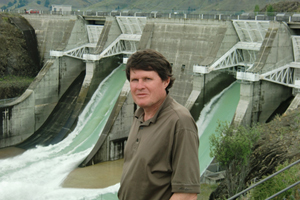Top water prize for 'thinking practitioner'
27 March 2014 | Story by Newsroom
Professor John Briscoe, who completed an undergraduate degree in civil engineering at UCT and now teaches at Harvard University, was named the 2014 Stockholm Water Prize Laureate for combining "world-class research with policy implementation and practice to improve the development and management of water resources as well as access to safe drinking water and sanitation".
Fusing science, policy and practice
The Stockholm International Water Institute (SIWI), who organises the award, said in a statement that Briscoe was living in a small village in Bangladesh in the mid-1970s where he learned first-hand how infrastructure for protection from floods and droughts could transform the lives of the poor. Later that decade, he worked as engineer in the government of the newly independent Mozambique, learning there that "you were a credible policy-maker only if you could resolve basic problems of building and running infrastructure".
His "genius lies in his fusion of science, policy and practice, giving him unrivalled insights into how water should be managed to improve the lives of people worldwide", says SIWI.
Briscoe says he was "very surprised and honoured" upon hearing that he had won the prize. "I am delighted for the recognition this gives to thinking practitioners, of which I consider myself one," he said. "At the end of the day, it is what happens on the ground that matters. All policies must be judged by whether they make a difference on the ground. I believe that the years I spent working at the micro level is what enables me to be an effective policy-maker."
Balancing the environment and the economy
His CV is packed with accomplishments at the macro level, too. The World Bank's 2003 Water Strategy was his brainchild, while, as country director in Brazil for the World Bank in 2005, Briscoe was praised for "bridging the divide between sound environmental management and economic development objectives in the Amazon and other parts of this rapidly developing nation".
Briscoe's scientific expertise spans many fields, including engineering, nutrition, epidemiology, demography, anthropology and economics, and he has tackled issues ranging from conflicts on international waters to novel approaches to integrating infrastructure, institutions and environmental sustainability in river basins.
His teaching emphasises the ability to work across disciplines while being deeply schooled in one. A career that spanned a number of countries and regions was informed by his "passionate commitment for sustainable economic development, his disrespect for constructed boundaries between sectors and people, and for his insistence that the voice of people who are affected - from the poorest of farmers, to the private sector, to political leaders - be heard", says SIWI.
"It is vital to give primary attention to the effect on people who will live with the consequences of policies and projects," says Briscoe. "Equally important is the voice of political leaders who have to take account of all of their people and who have to make difficult choices among competing priorities."
Story by staff reporter. Image supplied.
 This work is licensed under a Creative Commons Attribution-NoDerivatives 4.0 International License.
This work is licensed under a Creative Commons Attribution-NoDerivatives 4.0 International License.
Please view the republishing articles page for more information.










